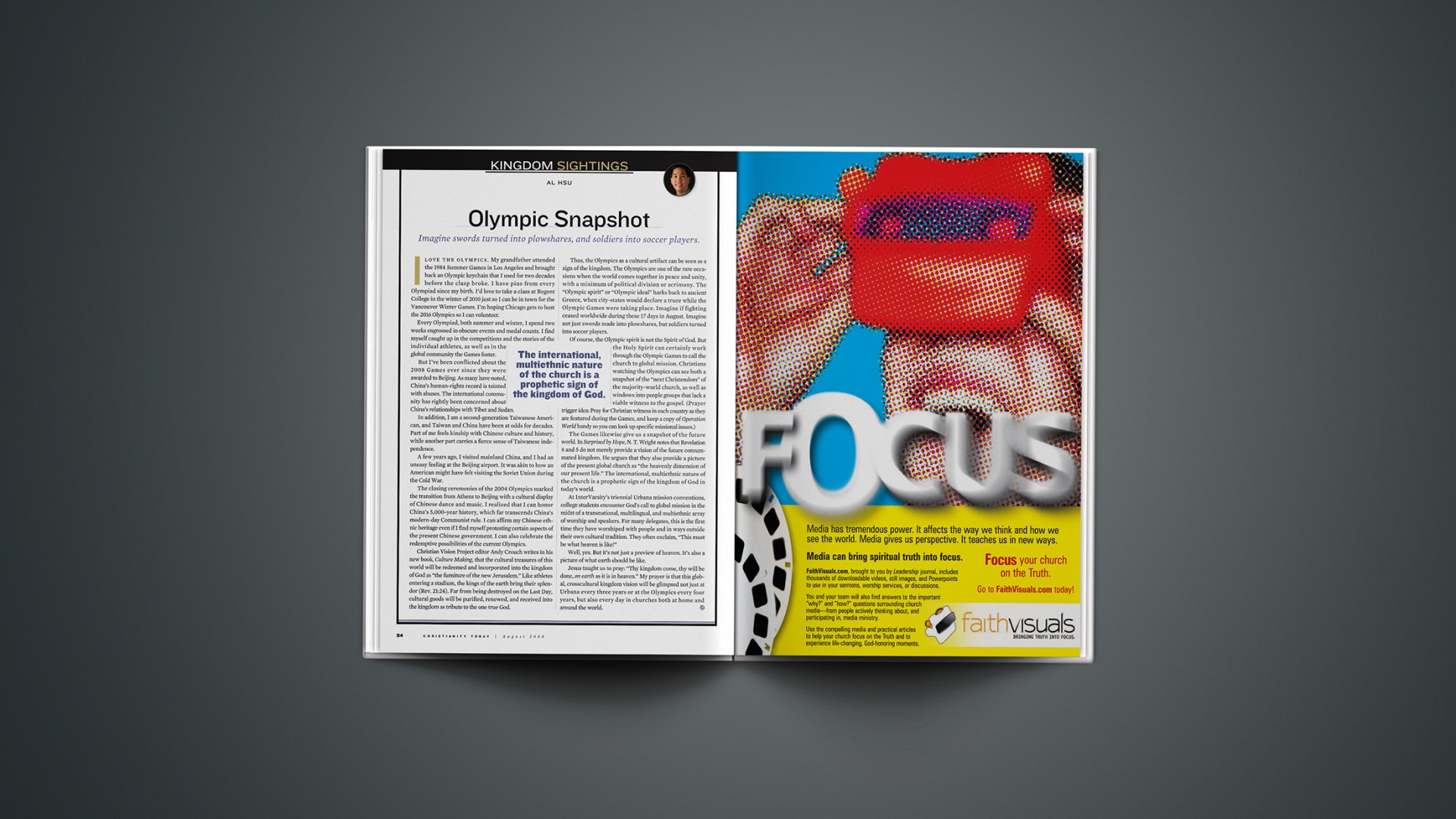I love the olympics. My grandfather attended the 1984 Summer Games in Los Angeles and brought back an Olympic keychain that I used for two decades before the clasp broke. I have pins from every Olympiad since my birth. I’d love to take a class at Regent College in the winter of 2010 just so I can be in town for the Vancouver Winter Games. I’m hoping Chicago gets to host the 2016 Olympics so I can volunteer.
Every Olympiad, both summer and winter, I spend two weeks engrossed in obscure events and medal counts. I find myself caught up in the competitions and the stories of the individual athletes, as well as in the global community the Games foster.
But I’ve been conflicted about the 2008 Games ever since they were awarded to Beijing. As many have noted, China’s human-rights record is tainted with abuses. The international community has rightly been concerned about China’s relationships with Tibet and Sudan.
In addition, I am a second-generation Taiwanese American, and Taiwan and China have been at odds for decades. Part of me feels kinship with Chinese culture and history, while another part carries a fierce sense of Taiwanese independence.
A few years ago, I visited mainland China, and I had an uneasy feeling at the Beijing airport. It was akin to how an American might have felt visiting the Soviet Union during the Cold War.
The closing ceremonies of the 2004 Olympics marked the transition from Athens to Beijing with a cultural display of Chinese dance and music. I realized that I can honor China’s 5,000-year history, which far transcends China’s modern-day Communist rule. I can affirm my Chinese ethnic heritage even if I find myself protesting certain aspects of the present Chinese government. I can also celebrate the redemptive possibilities of the current Olympics.
Christian Vision Project editor Andy Crouch writes in his new book, Culture Making, that the cultural treasures of this world will be redeemed and incorporated into the kingdom of God as “the furniture of the new Jerusalem.” Like athletes entering a stadium, the kings of the earth bring their splendor (Rev. 21:24). Far from being destroyed on the Last Day, cultural goods will be purified, renewed, and received into the kingdom as tribute to the one true God.
Thus, the Olympics as a cultural artifact can be seen as a sign of the kingdom. The Olympics are one of the rare occasions when the world comes together in peace and unity, with a minimum of political division or acrimony. The “Olympic spirit” or “Olympic ideal” harks back to ancient Greece, when city-states would declare a truce while the Olympic Games were taking place. Imagine if fighting ceased worldwide during these 17 days in August. Imagine not just swords made into plowshares, but soldiers turned into soccer players.
Of course, the Olympic spirit is not the Spirit of God. But the Holy Spirit can certainly work through the Olympic Games to call the church to global mission. Christians watching the Olympics can see both a snapshot of the “next Christendom” of the majority-world church, as well as windows into people groups that lack a viable witness to the gospel. (Prayer trigger idea: Pray for Christian witness in each country as they are featured during the Games, and keep a copy of Operation World handy so you can look up specific missional issues.)
The Games likewise give us a snapshot of the future world. In Surprised by Hope, N. T. Wright notes that Revelation 4 and 5 do not merely provide a vision of the future consummated kingdom. He argues that they also provide a picture of the present global church as “the heavenly dimension of our present life.” The international, multiethnic nature of the church is a prophetic sign of the kingdom of God in today’s world.
At InterVarsity’s triennial Urbana mission conventions, college students encounter God’s call to global mission in the midst of a transnational, multilingual, and multiethnic array of worship and speakers. For many delegates, this is the first time they have worshiped with people and in ways outside their own cultural tradition. They often exclaim, “This must be what heaven is like!”
Well, yes. But it’s not just a preview of heaven. It’s also a picture of what earth should be like.
Jesus taught us to pray: “Thy kingdom come, thy will be done, on earth as it is in heaven.” My prayer is that this global, crosscultural kingdom vision will be glimpsed not just at Urbana every three years or at the Olympics every four years, but also every day in churches both at home and around the world.
Copyright © 2008 Christianity Today. Click for reprint information.
Related Elsewhere:
An editorial, also posted today, examines what athletes have to teach us about hope.
Previous Kingdom Sightings columns include:
Grace and Peace | How a simple salutation points us toward a new society. (June 18, 2008)
A Multifaceted Gospel | Why evangelicals shouldn’t be threatened by new tellings of the Good News. (April 10, 2008)
The Vision Thing | Clarity came just as things got blurry. (February 21, 2008)










